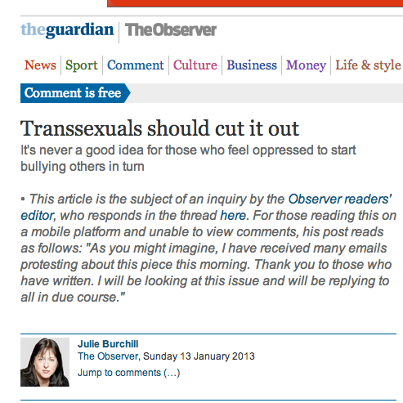feminism and testicles: julie burchill and transsexuals

By now you’ve probably heard of Julie Burchill’s column and the subsequent outrage it provoked. The piece, which was published in print and online, attracted more than 2000 comments before it was removed from The Guardian’s website.
In essence, Burchill—a freelance writer and feminist—outright attacked transgender people in her article ‘Transsexuals should just cut it out’. She called them ‘screaming mimis’, ‘bed-wetters in bad wigs’ and ‘dicks in chicks’ clothing’.
The editor of the Observer, John Mulholland, apologised in an online statement.
‘In light of the hurt and offence caused I apologise and have made the decision to withdraw the piece,’ he said.
He also mentioned that the paper will ‘report on these issues at greater length.’
The controversial column was written in defence of Burchill’s long-time friend and fellow writer Suzanne Moore. Moore provoked outrage on Twitter after writing that too often women were expected to look like ‘a Brazilian transsexual’.
To some, this might seem like a harmless comment. But in her piece ‘Julie Burchill has ended up bullying the trans community’, Roz Kaveney pointed out the ‘implied dichotomy between women on the one hand and Brazilian trans women on the other—as if Brazilian trans are somehow not women. But far more important is the fact well over a hundred Brazilian trans women were murdered in the last year alone.’
Moore would have been wise to note that not all transsexuals are women, nor do all of them look like supermodels. Some struggle with basic necessities like clean water and a safe place to sleep at night. And let’s not get started on the bigotry and intolerance that so often manifests into physical violence.
All this was exacerbated when Burchill went on her whole ‘how dare they cut their dicks off and think they’re a better feminist than me’ rant. The irony is that she was defending one friend against bullying, but in doing so bullied an entire community.
Kaveney put it succinctly when she wrote:
‘The basic point behind everything she [Burchill] says is that trans people lead essentially inauthentic existences and that hers, as a working-class novelist with a taste for lobster and champagne, is real life. The idea that some sorts of human life are true and others fake has a worrying history; you find it in many sorts of religious belief and various sorts or totalitarian philosophy.’
It’s not surprising that Burchill would write a scathing column—she is, after all, renown for that sort of thing. But it is strange that she would aim belittling phrases and language towards a minority group, given her history. (She has written widely about her lesbian relationships.) In an interview, Burchill says she ‘would never describe myself as “heterosexual”, “straight” … I like “spontaneous” as a sexual description.’
Obviously there is a very big difference between being sexually fluid and a transsexual. But for someone who is sensitive towards generalisations and the like, it seems a bit ludicrous to pen an article slamming the entire transsexual community. Transphobia should not be part of Burchill’s (or anyone’s) feminism. It is wrong and horribly oppressive.
However Simon Kelner, editor of The Independent from 1998-2011, recently wrote in Burchill’s defence.
‘What kind of country is this?’ he wrote. ‘Are we so cowed by vested interests that free speech, which includes the freedom to offend, is now constrained? Does the Twitter mob now set the rules on fair comment?’
Twitter is not a “mob”. It is a legitimate platform for airing views—equally as legitimate as the newspapers Kelner has edited and written for. But that’s another debate.
Whether or not you subscribe to Kelner’s logic, one thing is clear: sharp words and bigotry should never replace a rational and calm discussion. A bit of tolerance from Burchill and others wouldn’t hurt, either.


Pingback: Defending People » Mad Feminists: Developing the Argument